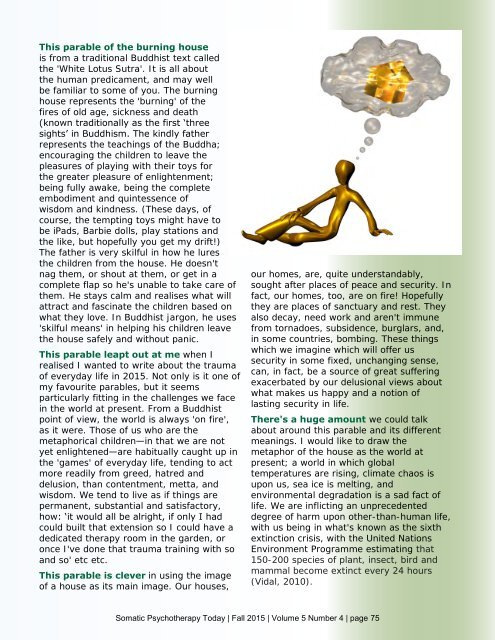Somatic Psychotherapy Today
1RCP3xp
1RCP3xp
You also want an ePaper? Increase the reach of your titles
YUMPU automatically turns print PDFs into web optimized ePapers that Google loves.
This parable of the burning house<br />
is from a traditional Buddhist text called<br />
the 'White Lotus Sutra'. It is all about<br />
the human predicament, and may well<br />
be familiar to some of you. The burning<br />
house represents the 'burning' of the<br />
fires of old age, sickness and death<br />
(known traditionally as the first ‘three<br />
sights’ in Buddhism. The kindly father<br />
represents the teachings of the Buddha;<br />
encouraging the children to leave the<br />
pleasures of playing with their toys for<br />
the greater pleasure of enlightenment;<br />
being fully awake, being the complete<br />
embodiment and quintessence of<br />
wisdom and kindness. (These days, of<br />
course, the tempting toys might have to<br />
be iPads, Barbie dolls, play stations and<br />
the like, but hopefully you get my drift!)<br />
The father is very skilful in how he lures<br />
the children from the house. He doesn't<br />
nag them, or shout at them, or get in a<br />
complete flap so he's unable to take care of<br />
them. He stays calm and realises what will<br />
attract and fascinate the children based on<br />
what they love. In Buddhist jargon, he uses<br />
'skilful means' in helping his children leave<br />
the house safely and without panic.<br />
This parable leapt out at me when I<br />
realised I wanted to write about the trauma<br />
of everyday life in 2015. Not only is it one of<br />
my favourite parables, but it seems<br />
particularly fitting in the challenges we face<br />
in the world at present. From a Buddhist<br />
point of view, the world is always 'on fire',<br />
as it were. Those of us who are the<br />
metaphorical children—in that we are not<br />
yet enlightened—are habitually caught up in<br />
the 'games' of everyday life, tending to act<br />
more readily from greed, hatred and<br />
delusion, than contentment, metta, and<br />
wisdom. We tend to live as if things are<br />
permanent, substantial and satisfactory,<br />
how: ‘it would all be alright, if only I had<br />
could built that extension so I could have a<br />
dedicated therapy room in the garden, or<br />
once I've done that trauma training with so<br />
and so' etc etc.<br />
This parable is clever in using the image<br />
of a house as its main image. Our houses,<br />
our homes, are, quite understandably,<br />
sought after places of peace and security. In<br />
fact, our homes, too, are on fire! Hopefully<br />
they are places of sanctuary and rest. They<br />
also decay, need work and aren't immune<br />
from tornadoes, subsidence, burglars, and,<br />
in some countries, bombing. These things<br />
which we imagine which will offer us<br />
security in some fixed, unchanging sense,<br />
can, in fact, be a source of great suffering<br />
exacerbated by our delusional views about<br />
what makes us happy and a notion of<br />
lasting security in life.<br />
There's a huge amount we could talk<br />
about around this parable and its different<br />
meanings. I would like to draw the<br />
metaphor of the house as the world at<br />
present; a world in which global<br />
temperatures are rising, climate chaos is<br />
upon us, sea ice is melting, and<br />
environmental degradation is a sad fact of<br />
life. We are inflicting an unprecedented<br />
degree of harm upon other-than-human life,<br />
with us being in what's known as the sixth<br />
extinction crisis, with the United Nations<br />
Environment Programme estimating that<br />
150-200 species of plant, insect, bird and<br />
mammal become extinct every 24 hours<br />
(Vidal, 2010).<br />
<strong>Somatic</strong> <strong>Psychotherapy</strong> <strong>Today</strong> | Fall 2015 | Volume 5 Number 4 | page 75


